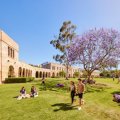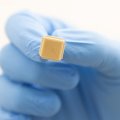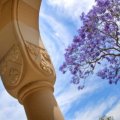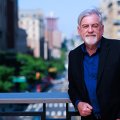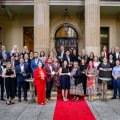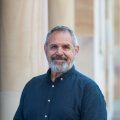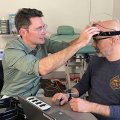Teresa Tang from Brisbane State High School in Queensland has won the International Brain Bee championship (IBB) held in Cape Town, South Africa this week.
Teresa represented Australia in the final event against competitors from 15 other countries, which included Canada, Germany, India, Italy, Kenya, Korea, Malaysia, New Zealand, Nigeria, Poland, Romania, Singapore, United Arab Emirates, USA and Wales.
The Brain Bee is a neuroscience competition for high school students and was held in conjunction with the International Congress of Psychology. Worldwide there are about 150 local competitions, each one involving many schools.
In Australia, Teresa competed against around 5000 year 10 students to become the national champion and represent Australia in the international championship.
Professor Linda Richards of the Queensland Brain Institute (QBI) at The University of Queensland began the Australian Brain Bee Challenge in 2006 and it quickly went nationwide.
“Although Australians have placed a number of times, this is the first time we have taken out the top honours,” she said.
“It’s incredibly exciting for Teresa who worked hard to meet the challenges presented. We are all so proud of her.” said Professor Richards.
QBI Director Professor Perry Bartlett said “this is a wonderful recognition of the talent we have in Queensland and the high standard achieved by all students entering the competition. It is also recognition of the incredible program and mentorship provided by Professor Linda Richards and her team over the past six years”.
In both the Australian and international competitions, Teresa was tested on her knowledge of the human brain including such topics as intelligence, emotions, memory, sleep, vision, hearing, sensation, Alzheimer’s disease, Parkinson’s disease, schizophrenia, addictions and brain research. Teresa prepared for the competition by studying neuroscience-specific books downloaded from the internet.
The competition involved oral tests, a neuroanatomy laboratory exam with human brains, a neurohistology test with tissue specimens and microscopes, and a patient diagnosis component with student actors.
Sample questions included: What kind of molecules are semaphorin, ephrin, neuropilin and plexin? Sonic hedgehog is important for the development of what part of the nervous system? What is the medical term for when you start dreaming before you fall asleep? Stargazer mice are experimental models for which type of epilepsy?
Teresa’s prize pack includes $3000 and a trophy.
The International Brain Bee was created to motivate students to learn about the human brain, and to inspire students to enter careers as clinicians and researchers to treat and find cures for neurological and psychological disorders.
Major sponsors for the Australian Brain Bee Challenge are the Queensland Brain Institute, The University of Queensland, AD Instruments, Carl Zeiss PTY LTD Australasia and the Australian Neuroscience Society.
The Australian Brain Bee Challenge opens in October for entries from students wishing to become the 2013 Brain Bee Champion. Registration is free and teachers may nominate one student through to their whole Year 10 class.
For more information or to register visit www.abbc.edu.au
MEDIA CONTACT
Mikaeli Costello
Phone: +61 401 580 685
Email: Mikaeli.Costello@uq.edu.au
NOTES TO THE EDITOR:
Queensland Brain Institute
The Queensland Brain Institute (QBI) was established as a research institute of The University of Queensland in 2003. The Institute operates out of a $63 million state-of-the-art facility and houses more than 30 principal investigators with strong international reputations. QBI is one of the largest neuroscience institutes in the world dedicated to understanding the mechanisms underlying brain function.
Australian Brain Bee Challenge
The Australian Brain Bee Challenge (ABBC) is recognised by the International Brain Bee competition held in the United States and winners of the ABBC may have the opportunity to participate in the international competition.
The ABBC is calling for entries for students wishing to become the 2012 Australian Brain Bee Champion. Registration is free and teachers may enter an individual student, a small or even their whole Year 10 class or less, for this great experience.
Designed to inspire students to pursue careers in neuroscience research, ABBC is the only neuroscience competition in the country for high school students was initiated by the Queensland Brain Institute in 2006.
For more information or to register visit www.abbc.edu.au
International Brain Bee
The IBB is a non-profit grassroots effort funded mainly by private contributions, but also helped by dozens of partners including The Society for Neuroscience, The International Brain Research Organization, and many colleges, universities, foundations, museums, hospitals, libraries, institutes, societies, and commercial companies and businesses. Organizations, such as The American Psychological Association and the Canadian Association for Neuroscience, host the IBB Championship at their annual conventions.
The 2012 International Brain Bee was held in Cape Town, South Africa on July 22nd, 2012.
http://www.internationalbrainbee.com/
.jpg)
